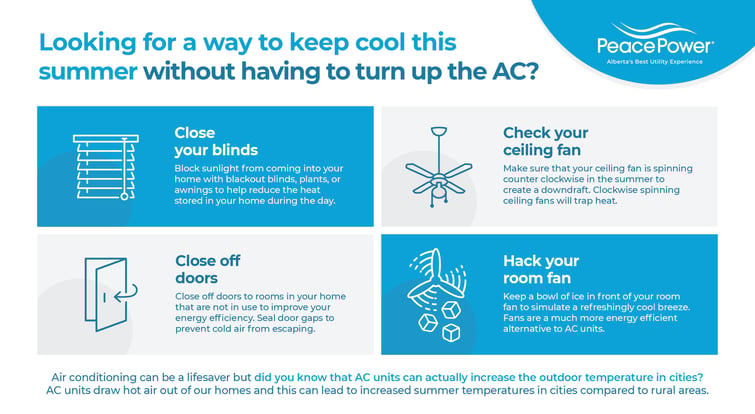
Keeping your home cool in the summer months can be a struggle. Alberta doesn't often get into high temperatures, but when the heat wave finally arrives everyone has to ask themselves: what is the best way to keep my home cool without wasting energy? Luckily there are a lot of ways to lower the temperature in your house without turning on the AC.
How much energy does the average air conditioning unit consume?
Air conditioning units can be a lifesaver in a heat wave, but the environmental impact of AC is unmistakable. So, how much energy does an AC unit consume? Anywhere between 2500 and 10000W. Household air conditioning units require almost as much energy as a furnace. Before you rush out to buy a new AC unit this summer, think about buying one of the ENERGY STAR certified electronics to make sure that the device is energy efficient. Even if you end up paying more for the product at checkout, you may find that it actually saves you more money in the long run when you factor in the energy savings.
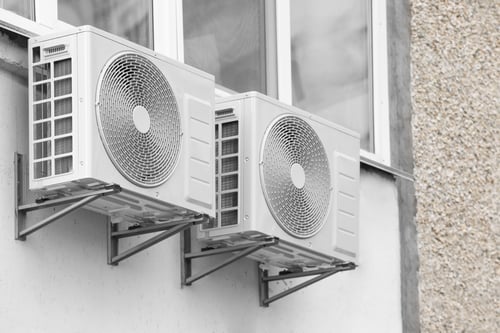
Beyond energy use, AC units also have a greater environmental impact, especially within cities. Research has shown that AC units play a role in increasing the outdoor temperatures in densely populated areas. Air conditioning units work by funneling heat outside, causing the temperature inside to drop but outside to climb. This urban phenomenon has been found to affect some of the world's biggest cities adversely.
How can I lower my room temperature without air conditioning?
The best way to lower the temperature in your home is to reduce the total amount of heat that it absorbs throughout the day. Little home improvements can make a big impact on your comfort levels in a heatwave. Installing blackout blinds in your windows will reduce the total amount of light coming into your home. Keeping windows closed during the hottest hours of the day will help to prevent hot air from blowing through your home. Only opening your windows in the morning and evening will help ensure you're letting in a cool breeze instead of a hot one.
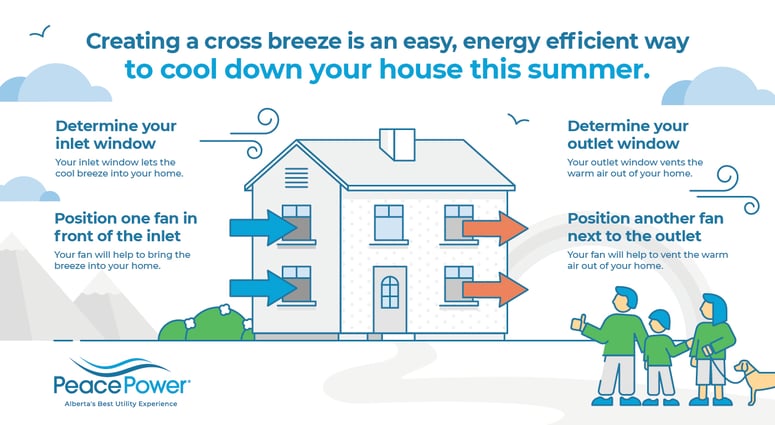
Room fans are the most energy efficient and cheapest way to cool down during the summer. With energy consumption rates between 30 and 120W, room fans are significantly more energy efficient compared to AC units. One thing to note about fans is that they don't actually lower the temperature of the air, but they increase air circulation to create a refreshing breeze. To get the most out of your room fans, try this life hack: set up your room fan next to a bucket of ice. For a fraction of the energy use of an air conditioning unit, you create the same effect and lower your environmental impact. As the warm air from your home passes over the ice, it will start to slowly melt the ice, thus creating a refreshing cool breeze.
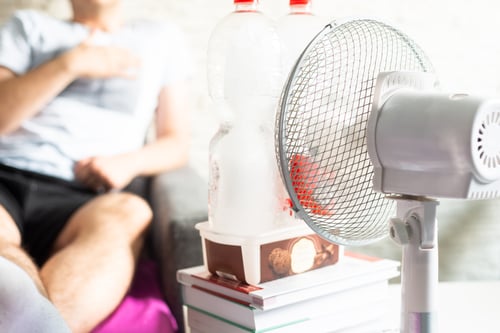
Make sure that your household is fitted with Compact Fluorescent Lamps (CFLs) or Light Emitting Diodes (LEDs) to reduce the total amount of heat generated by light bulbs in your home. All light sources generate heat, so keeping lights off during the day and switching to energy efficient light bulbs will help reduce excess heat in your home.
Avoid using heavy appliances during the day. Appliances that use a lot of energy also generate a lot of heat. Even energy efficient home appliances can have a big impact on household heat. Almost every large appliance in your home, including the dishwasher, washing machine, clothes dryer, and oven will give off heat, making it a little hotter in your house. This summer, take every opportunity you can to cook outdoors on the grill to avoid increasing the temperature inside your home. Limiting the use of these common household devices to the evening or morning will help to lower the temperature in your home.
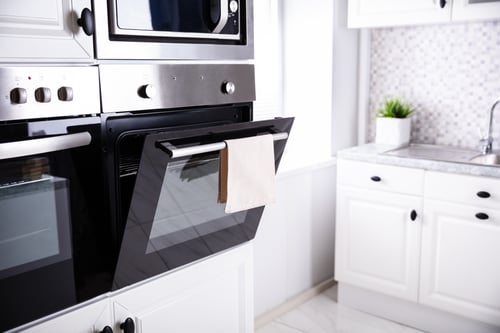
Turn off devices when not in use. The television, computer monitor, coffee pot, and everything else in your home gives off heat when it's switched on; even in rest mode. Turn on your home exhaust fans. Kitchen and bathroom fans can help ventilate your home by making it easier for hot air to escape. In addition to all of that you can also use cotton sheets on your bed and your clothes to stay cool like the ancient Egyptians did with breathable fabrics.
How does humidity affect temperature regulation in the body during a heatwave?
Humidity can also play a big factor in the way that our bodies regulate temperature. Alberta is notoriously dry, especially in the central and south regions near Edmonton, Calgary, Lethbridge, and the badlands near Drumheller. The humidity in the northern regions tends to be a little more hospitable in places like Grand Prairie, Peace River, and Wood Buffalo, but all across Alberta it is consistently dry. Our province's infamously dry climate comes with pros and cons in respect to temperature regulation.
The human body is designed to regulate temperature through sweat, so when the humidity is low, sweat can easily evaporate to cool the body. If the humidity is too high, the sweat will stick to the skin and inhibit our bodies' ability to regulate internal temperature. This is just one of the reasons why cold showers feel so good at the end of a hot day. Rinsing off that thin layer of sweat right before bed will allow your skin to breathe, thus increasing your ability to regulate temperature overnight.
While lower humidity in the heat has its benefits, it is important to be aware that low humidity can also be negative health effects. Almost everyone in Alberta can relate to that feeling of dry skin (xerosis, acne, itchy sinuses, nose bleeds, itchy throat, chapped lips, etc.); One of the best ways to treat these chronic health conditions is with an air humidifier unit. Our body is made up of 70% water, and our bodies are constantly losing water through sweat, our breath, and other natural processes. Air humidifiers can also improve your ability to breathe overnight, improving sleep quality and reducing the severity of snoring conditions. The home's ideal humidity for summer is in the range between 20 and 40%. To make the most of the cooling power of your home humidifier unit, make sure that you fill it with cold water and throw a couple of ice cubes in there for a cool mist.
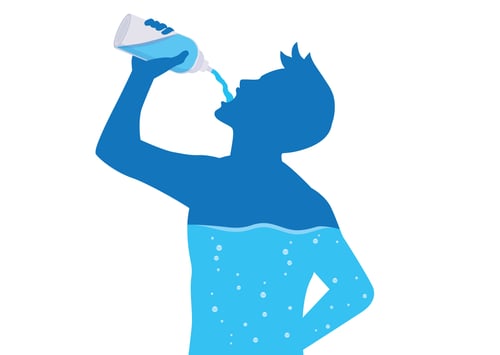
Drinking water throughout the day is essential to maintain your health in a heatwave. Combat the harmful effects of heat stroke or hyperthermia by keeping a water bottle with you at all times. Your body will lose its ability to regulate temperature in extreme cases of dehydration, resulting in feverish symptoms and fatigue.
Do your best to keep cool this summer and stay safe out there! We hope that you found these energy efficient home cooling tips helpful. Please let us know if you found this post useful and tag us on social media with your own home cooling tips.
Contact us
Peace Power is Alberta's Best Utility Provider
Electricity, Natural Gas, and High-Speed Internet
Providing utility services throughout Alberta, including Edmonton, Calgary, Grand Prairie, Red Deer, Slave Lake, Lethbridge, Airdrie, Fort McMurry, Fairview, Sherwood Park, Medicine Hat, Spruce Grove, Leduc, St Albert, Fort Saskatchewan, and everywhere in between.
